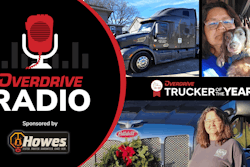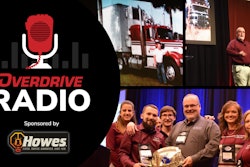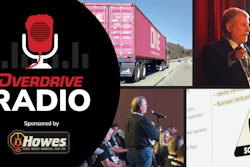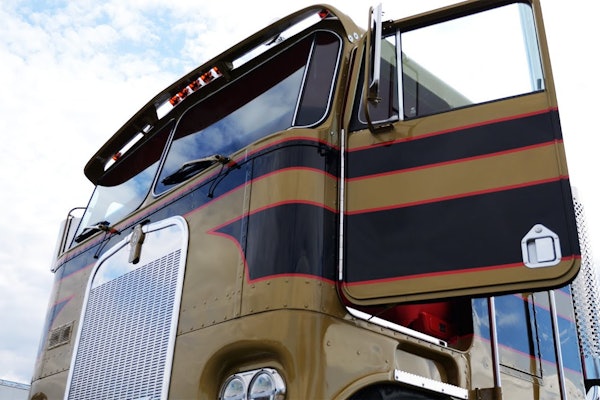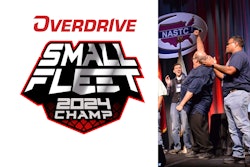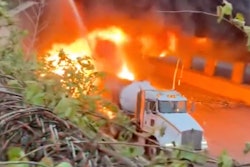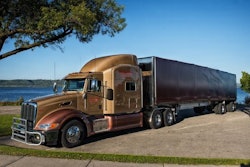Manteca, California-based Gill Freightlines small fleet owner Surinder Gill's family's trucking lineage traces back through 60 years of OTR work done by his father, Gurmail Singh Gill, over well more than one continent. The elder Gill hauled first in his native India, some in the Middle East, and finished out his career in the United States.
Surinder Gill himself had dipped his feet in trucking as a dispatcher by the time his father passed in 2018. "How do I honor my father and his legacy?" he asked himself at the time. Answer: "We purchased a truck and got a trailer, and I put his photo on the back."
 His trailers to this day feature that photo and the "In loving memory" text for Gurmail Singh Gill.
His trailers to this day feature that photo and the "In loving memory" text for Gurmail Singh Gill.
"He'll always be on the road, in a way," as his son puts it in this edition of Overdrive Radio, telling that story but much else besides. Small fleet owner Gill was in part the subject of Overdrive Executive Editor Alex Lockie's reporting on the collapse of the Convoy broker this past Fall. That reporting told the tales of a variety of owner-operators and small fleet owners just like 28-year-old Surinder Gill who, months following the abrupt shuttering of Convoy in October 2023, remained unpaid for in some cases thousands’ worth of work hauling.
 Overdrive Radio's sponsor is Howes, longtime provider of fuel treatments like its Howes Diesel Treat anti-gel and Lifeline rescue treatment to get you through the coldest temps, likewise its all-weather Diesel Defender and Howes Multipurpose penetrating oil, among other products.
Overdrive Radio's sponsor is Howes, longtime provider of fuel treatments like its Howes Diesel Treat anti-gel and Lifeline rescue treatment to get you through the coldest temps, likewise its all-weather Diesel Defender and Howes Multipurpose penetrating oil, among other products.
Convoy's debt to Gill alone is nearly half of the worth of the required $75,000 bond any broker must hold to cover claims. As you'll hear in the podcast, Gill believes that bond amount shouldn't be a static number applicable to any and all brokerages equally, but rather dependent on the amount of business a broker handles. Larger the broker, larger the bond.
Convoy, recall, had a valuation in the billions, according to pre-collapse reports. Given the volume of freight -- and money -- that flowed through the business, Gill asks, shouldn't they be required to hold a bond much, much higher than $75,000? By the time he got to the bond company with his own claim, the full amount in the surety had already been kicked to court deliberation on just who would get paid, and how much.
As of this past week, Gill remained entirely unpaid for those final loads, though the small fleet owner offered up a bit of information he'd learned since the conversation featured in this podcast. Contact made with the Hercules Capital company, which effectively owns the business side of Convoy post-collapse, yielded a name there for everything having to do with the shuttered brokerage.
[Related: Convoy's unpaid carriers finally settling with Hercules Capital?]
“I have reached out to Hercules Capital,” Gill said, “and was given the contact of a Greg Peterson” for everything Convoy-related with the company, a venture bank that took control of all of the imploded company, but for the technology platform. That platform, also previously reported, was sold off to Flexport and rebooted for freight brokered through them, a fact that clearly frustrates Gill and some among the unpaid carriers who’d worked with Convoy for years, as you'll hear. Take a listen:
[Related: Ikea v. Convoy: Lawsuit reveals glimpse at contract rates, broker margins]
Surinder Gill: The contact that I had, he calls me I think three days after the article came out. He's like, "Oh, hey, how's it going?" I was like, "Good." "Oh, I just wanted to run some things by you. Oh, by the way, I see your article, you're pretty famous now." I was like, "Oh." I fired back saying, "Not as famous as you guys. I might be in the headlines for other reasons, but yeah, definitely not as popular as you guys." So then he laughed.
Todd Dills: That was the voice of Surinder Gill, owner of Gill Freightlines out of Manteca, California.
Surinder Gill: We live here for the Sunshine, but recent years they've been pretty wet.
Todd Dills: In more ways than one. When it rains, it pours. Gill was speaking up top about the now infamous collapse of the Convoy Company as a going brokerage concern this past fall. He referenced the story Overdrive executive editor Alex Lockie wrote earlier this year telling the tales of a variety of owner operators and small fleet owners just like 28-year-old Gill who, months following the abrupt shuttering of Convoy in October, remained unpaid for in some cases thousands worth of work hauling. In Gill's case, unpaid invoices were to the tune of around $35,000 worth of dedicated hauling, his several company drivers and a larger number of owner operators have been doing big names in canning and general food products like the post company. I'm Todd Dills, and in this edition of the Overdrive Radio podcast for April 22nd, 2024 we'll hear that as of the last week, Gill Freightlines remains unpaid. The small fleet offered up a bit of information owner Gill's learned since our conversation.
Contact made with the Hercules Capital Company, responsible for all business debt incurred by Convoy, yielded a name at least to attempt to recruit payment for carriers who remain unpaid. "I have reached out to Hercules Capital," Gill said, "Was given the contact of a Greg Peterson," for everything Convoy related with the company, a venture funding firm that took control of all the imploded company, but for the technology platform. That platform was of course sold to the Flex Board company and quickly rebooted for freight brokered through them. It's a fact that frustrates Gill and others among the unpaid carriers who've worked with Convoy for years, which we'll hear well more about in this part one of two podcasts sharing Gill's story. It tracks back to his first days in trucking. The son of a longtime owner operator father whose own work behind the wheel spans 60 years and three continents, and who has memorialized on the back of his son's currently owned dry vans. After the break, we'll jump right into the elder Gill's history with Gill Freightlines owner, Surinder Gill. So keep tuned.
Speaker 3: Prepping for spring? Time to reach for Howes. Clean, protect and lubricate your diesel engine with Howes Diesel Defender. It'll provide superior cleaning, maximum lubrication, and a guaranteed increase in fuel economy for all your other spring projects reach for Howes Multipurpose lubricator and penetrating oil with over 1,001 uses on almost any surface. It's the only can you'll need. Find Howes Products at retailers and truck stops nationwide and visit Howesproducts.com for more information.
Todd Dills: Visit H-O-W-E-S, HowesProducts.com for much more information about the company. Here's Surinder Gill telling the story of his family's trucking lineage, which traces all the way back to India with his father Gurmail.
Surinder Gill: He spent about 60 years driving across three continents. Started off in India and he also drove in the Middle East. Then finally when we migrated to the States, he finished off his career here in the States. Used to go long haul, did Drayage Intermodal. So after he passed away in 2018, we started to ... I was forced with ... I was working for somebody as a dispatcher and I wanted to do something to honor my father. Me and him had an old school relationship, he wouldn't tell me I loved you, or "Hey, here son, let's go play catch." No, it was always very one way relationship. He's an old school dad. I was like, how do I honor my father and his legacy and whatnot? So we purchased a truck, got a trailer, I was like, "All right, I'll just put his photo on the back and say, 'In Loving memory,' and then it's got his photo." So he'll always be on the road in a way. That was the point of that.
Todd Dills: What was his name?
Surinder Gill: His name was, so G-U-R-M-A-I-L Gurmail Singh Gill.
Todd Dills: Did you grow up there in Manteca?
Surinder Gill: We flew into Los Angeles and we first lived in a city called Fresno. Most of our family was from Fresno, and we lived there for several years and then ever since we just started moving on up due to work. Manteca, we've been here since 2015. I've never driven, actually, I don't have a CDL.
Todd Dills: Oh, you don't drive?
Surinder Gill: So I started after high school, I graduated in 2013 and a month later I started working as a dispatcher at a place where my dad used to drive. So I worked there up until his death in 2018. After that I started doing my own dispatching, booking freight, buying our own trucks. So my own operation started in 2018. But I've officially been dispatching since 2013, so 11 years. I know how to drive. I mean, now I don't know where you're going to record and play this, but if I need to get a truck from point A to point B, I can do it.
I never took that next step and got a CDL. I have a sports car. I have a heavy foot sometimes. So I know the fines are heavier with a class A than a class C. When I dispatched, it was a big terminal and in the evenings, me and my other dispatcher we would go out into the yard and practice backing up trailers. All right, we'll create a space for us and back in there and pull out and drive around the yards so we got a hang of shifting, backing up. That was an intermodal company so the rail yard was very close. So we would sometimes go to the rail yard to take a trailer out, take one in, nobody cared. As long as they knew you by face, you get to know these people, they don't ask for much. But I never did anything on the roadways. That'd be a little crazy on my end. I wouldn't risk my insurance, they wouldn't cover me.
Todd Dills: It wasn't long after the founding of Gill's small fleet, Gill Freightlines that he tried out and really liked the Convoy Brokerages app for booking freight. He was such a fan of it in fact, that much of his small fleet's business became centered around moving freight through Convoy. Eventually a series of dedicated lanes that were fundamentally routine stable business as he tells in what follows here. So he notes two, among his primary contacts they were high-level members of the team who tested out new versions of the app with Gill, soliciting his feedback on potential changes.
Surinder Gill: The guy used to call me when Convoy wanted to unveil a new design for their app. So I think they had a group of carriers that they would call and get their inputs, "Hey, if we do this, how does this look? Or if we do it like this, how does that look? Or should we do this or not that? What's your feedback?" So I felt honored when Conway was operational and they would ask us these things because it made me feel more a part of their program. But ever since the bankruptcy issue and the lack of communication and him saying, "Well, I had no idea." I'm like, "You're the CEO's brother. You guys don't talk about this at family dinners?" So it's like ever since after that, it's always left a bad taste with me because I lost not only money, but it's like the people that worked with me, we lost our accounts.
Basically our whole business model was built off of their platform. I guess it goes back to the age-old saying of, "Don't put all your eggs into one basket." It just seems like it was too ... It's like the Titanic. I'm sure when the folks saw it in England, they're like, "Damn." One guy did say it, right, in that movie? "This ship is so magnificent or beautiful that even God can't sink it." So that's how Convoy's business started to look like, their platform was unstoppable, the amount of work they were getting, their equipment, their power only programs. That's what we were doing for them, power only. It was just too big to quit. I would say, too legit to quit. That's the saying? We had no ideas about these bankruptcy issues or finances. Now you sit back and think like, "Wow, man, we should have seen the signs."
Todd Dills: Yeah, it sounded like when you were talking to Alex from what he wrote, that there were some ... That you did hear rumblings and/or witnessed some things that made you think twice toward the end there.
Surinder Gill: Right before their collapse, they were renting trailers from Premier Release, X-Release, McKinney, pretty much all the big equipment providers, and we would get taxed by Convoy sometimes. We didn't think much of it, right? We're just thinking, "All right, maybe they're buying their own trailers now." Which they were. But they would tell us, "Hey, could you guys go drop this specific trailer off at So-and-So's terminal because we want to send it back for repairs?" But when we would go to the facility for example, X-Release, they would tell my drivers, "You guys do know that Convoys going into bankruptcy, right? They're going to go bankrupt because they're terminating their contract with us way too soon." We thought it was because they're buying their own trailer so they don't have need for this. So we listened to them, we listened to them, and we would just shrug it off because I would ask my point of contact and he would say, "Oh, no, no, we're bulking up on our own inventory now. Don't listen to them." But we should have paid more attention to that and been more on top of their quick-pay choices.
Even that was a big thing too. They went from giving people free quick-pay in two or three days to pushing out their payment terms to 30 days and then charging to give quick-pays. Still even then we're like, "Oh, maybe they're being affected by the economy because it is pretty bad with trucking. Maybe it's nothing." But those were some of the signs we should have caught onto more serious insight to why is all of a sudden this thing changing, this bulletproof business model? Now, since that October's collapse, any time that I'm working with a brokerage and something even slightly starts to look weird, I started questioning it right away. Not playing with fire again. We were at four company and nine owner-operators. So we were a small decent operation. We were running dedicated routes, so people had schedules, people started to live their life according to, "All right, well this is how much I'm going to do, how much I'm going to work, how much I'm going to make."
So they started making purchases. I'm sure as a normal family household operates, once you start seeing a consistent amount of work, you're like, "All right, maybe if I go buy this thing or if I go buy this house or if I go do this, I have enough coming in due to the work." It just sucks that I was telling Alex, the biggest thing that hurts is that these folks did what they did. Every business has its ups and downs, I'm not mad at that.
If they couldn't handle this economy well, it is tough. It's really tough. What just pisses me off is that they did what they did and the big head haunches are already working for somebody else again, and their lives are back to normal. This bankruptcy doesn't affect them, it doesn't ruin their livelihoods. While there's people that I'm sure that were working with me, we stomach the $35,000 as a company as a whole, but there are some people that when I told them, "Hey, I can't give you this $5,000-$6,000," it really hurt them. The owner operators. I don't know how they fared, I don't know how they stomached it, but I do know they don't work with me anymore and they probably bad mouth my name to the local community here. "Hey, Gill's Freightlines? Oh yeah, they juked money or they did this." It's like we suffered the real consequence.
Todd Dills: Meanwhile, former Convoy CEO Dan Lewis is no longer the CEO of a partly venture funded, now out of business, freight platform. But is nonetheless a technical advisor with Flexport now operating the Convoy platform, Gill went on to note.
Surinder Gill: The FMCSA or the DOT up in Washington D.C, they need to make stricter guidelines for brokers now. This whole sham of $75,000 bond, that needs to go. They need to go tell these people, when you're valued at $3 billion, like Convoy was, "Hey, you need to up that bond to a million dollars." Now that you've hit this plateau, we know if you're worth $3 billion, you have a lot of carriers working for you, have a lot of contracts, there's a lot of financials involved. We need to safeguard the motor carriers. It just feels like, and it's not just Convoy who bellied up, there's Elite Transit that bellied up. There's a lot of other brokerages that shuttered, small or big. But it just seems like that $75,000 charity bond, I don't know when it was specifically introduced, but they need to revisit that.
Todd Dills: Gill wasn't directly involved in trucking when the bond was boosted from a mere required $10,000 for brokerages to get authority on up to $75,000. That happened not all that long ago, in fact, with the legislation enabling it, passing in 2012, MAP-21 highway bill, some of you may remember. Implementation of the increased bond requirements followed not long thereafter. Gil believes the required bond amount might better be tied to a company's actual revenues or even its valuation. Regular readers will recall reports of the Convoy brokerages market valuation in the billions of dollars just prior to its implosion last fall.
Surinder Gill: The day after it finally happened, the loads were cleaned out, the day after we finally found out they're not in operation, I filed a claim. But we got a letter from their insurance saying, "Hey, we've given this money to the Federal court, and now that court will decide who gets what and how much." So once you hit a certain thing, it's like a carrier, if a motor carrier has 100 trucks, these big, big corporations, they go self-insured because they're not going to pay an insurance company, an insurance company is not going to insure them so they're self-insured. So anything happens they got to foot the bill. Why do these mega brokers, and I'm talking people even like CH Robinson, they seem bulletproof, but they have-
Todd Dills: They probably have a $75,000 bond.
Surinder Gill: Yep. So what's to say that CH Robinson, one of the biggest brokerages in the world, if they belly up, they're only liable for $75,000? What the hell? That's not fair to the customers who ... Like IKEA, now that I'm seeing the rumblings and the articles you're pushing out, IKEA got in trouble from the carriers. It's not fair because they probably gave the money to Convoy.
Todd Dills: I don't think they gave the money to Convoy, I think they've given the money now to the court and they're saying, "You guys figure out who to pay because we don't have the contract with all these carriers, but they're all coming after us for the money." So here it is.
Surinder Gill: That's at least nice of them. They didn't hang on to the funds. So it's a sign of goodwill, that's awesome. I wish more of the shippers, because I've reached out to the shippers too, but I wish more of them were like IKEA. We found no success. I've been able to find not a single dime. All the avenues seemed closed. We were running dedicated contracts for a shipper called R-Dog, tomato paste, canned peaches from Nevada to California. They distributed the empty cans for the canned food.
You ever heard of Del Monte? So they supply Del Monte their empty aluminum cans, or those containers. I have all the bill of ladings. That's where a chunk of our money's lost. It's with them and then the cereal manufacturer, Post, Post consumer brand. So we used to do a lot of work out of Salt Lake City, Nevada to California, of course. They're another one of those people, we reached out, actually the day after because there were trailers loaded with product to get shipped out. We had load pickup numbers. Luckily we didn't transport the goods because we would've been out.
Todd Dills: How have you pivoted? Because it sounds like that was the entire business at that point.
Surinder Gill: Yes. So I mean luckily we did probably about, I would say, 75% of our work through Convoy. But we did have our own equipment on the side that we did local work. The majority of these accounts that were dedicated was built through Conway's network of power only trailers because they could provide, and they purchased a lot of equipment. So it worked out for us. I didn't have to foot the bill of extra lease, thousands of equipment. So after this happened, we had to downsize. Immediately the folks working with us that did not have enough equipment or didn't have enough funds to buy equipment to continue working, they went other avenues where they could get equipment or however they needed to fare. We just had to start buying equipment. So on top of the $35,000 that they owed us, we now have to start spending some money to buy equipment and build our infrastructure.
Todd Dills: You're talking trailers mostly here?
Surinder Gill: Yes, trailers. Trailers and business. Since we have these contracts and I reached out to R Dog and Post and see if we can get the business we were running for them, because they knew who we were. We built a report with the shippers. "Hey, we're the carrier, we're working for Conway." But they saw my drivers every day of the week, and we went back to them after Conway's collapse, and I don't know, I feel like they had a bad taste in their mouth too. They probably looked at us as if it was us. It was so sudden that nobody was willing to talk like our R Dog account, JB, no not JB, but Swift, Swift was doing a little bit of the work. So they got all of the work. Instead of them partnering with new carriers, they just went to the folks already working. Because it is scary for a shipper too, I would assume if your whole leg of the operation falls off a cliff, pretty much, where are you going to go?
Todd Dills: What do you think? Should brokerages required bond amounts be in effect tied to the amount of business they're doing? Weigh in with a comment under the post that houses this podcast dated April 22, 2024 at OverdriveOnline.com/overdrive-radio. Or get in touch directly. Part two of my conversation with Gil, we'll dig further into Gills broader thoughts for the future of the business, including ideas for building out the business with more stable relationships with direct customers in mind, the center of it.
Difficult as that may be for a small fleet, it's achievable with both time and persistence, as countless examples have shown through history. So stay tuned wherever you're listening. Overdrive Radio is on Spotify and SoundCloud, Apple Podcasts and YouTube, Tune in, Podcast Addict, most any listening platform. Subscribe so you don't miss an episode, and you can find me and all of our episodes also via OverdriveOnline.com/Overdrive-radio. Big thanks to you for listening.


